Unit 1 Honesty and responsibility Grammar and usage 课件(共46张)2024-2025学年高二英语牛津译林版(2020)选择性必修4
文档属性
| 名称 | Unit 1 Honesty and responsibility Grammar and usage 课件(共46张)2024-2025学年高二英语牛津译林版(2020)选择性必修4 | 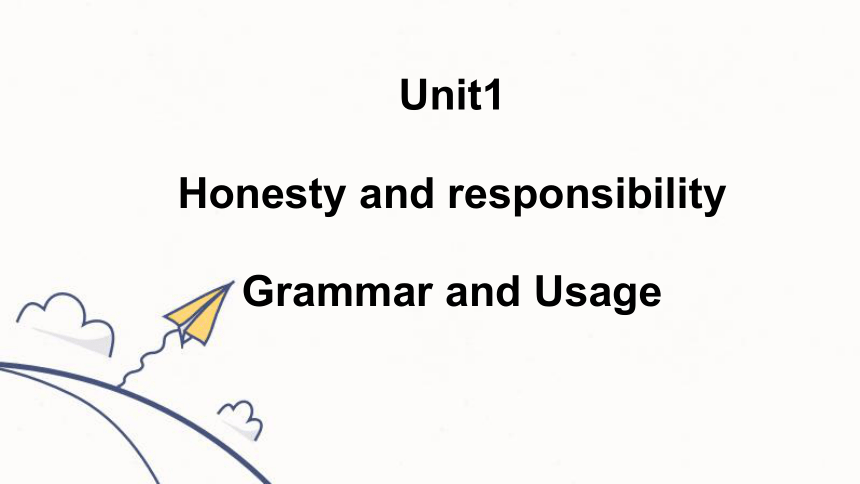 | |
| 格式 | pptx | ||
| 文件大小 | 1.1MB | ||
| 资源类型 | 教案 | ||
| 版本资源 | 牛津译林版(2019) | ||
| 科目 | 英语 | ||
| 更新时间 | 2025-05-02 19:22:12 | ||
图片预览

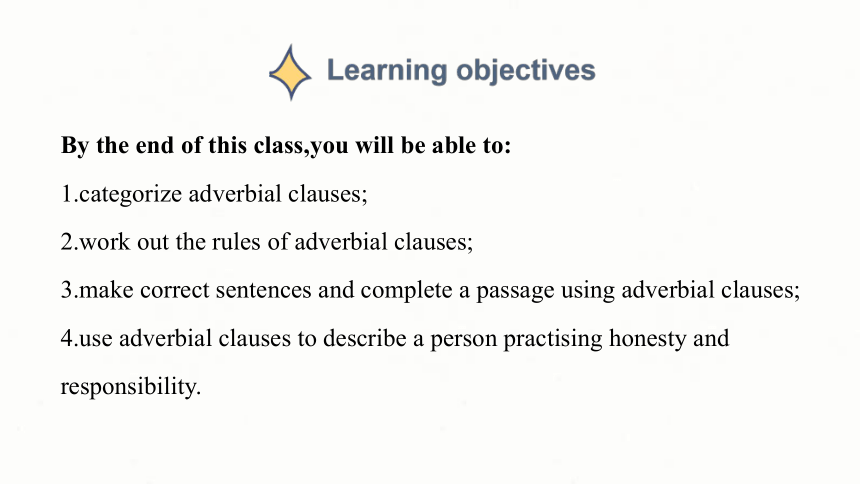
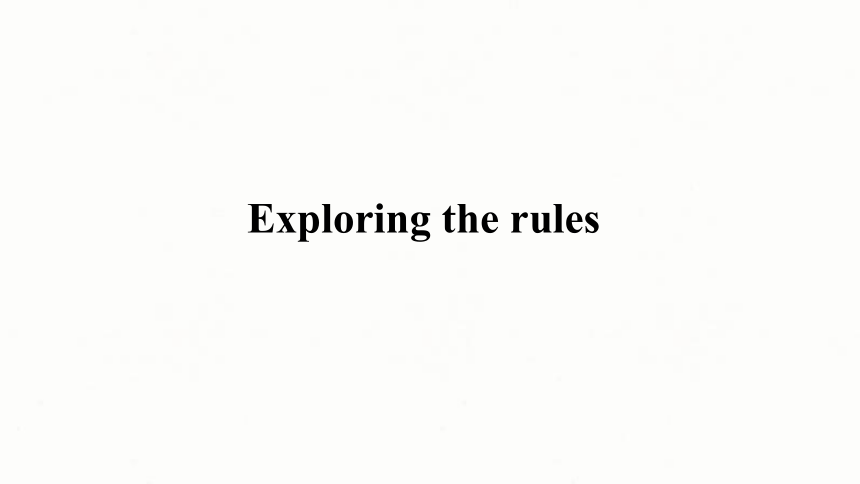


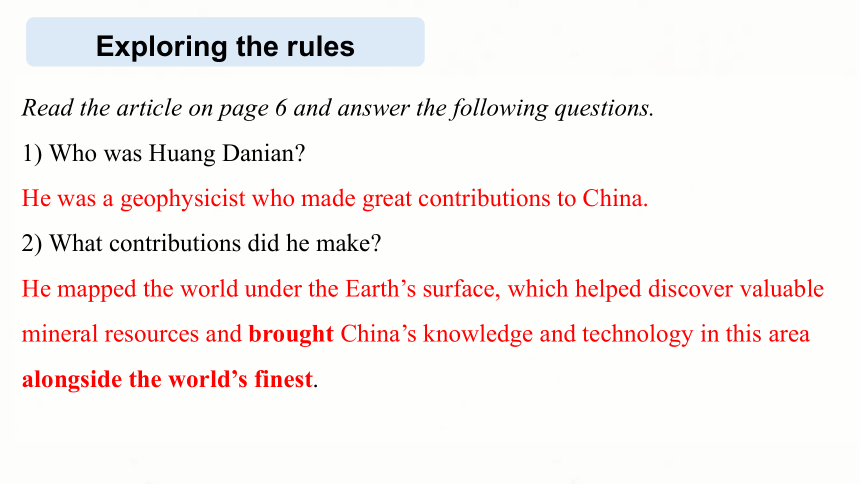
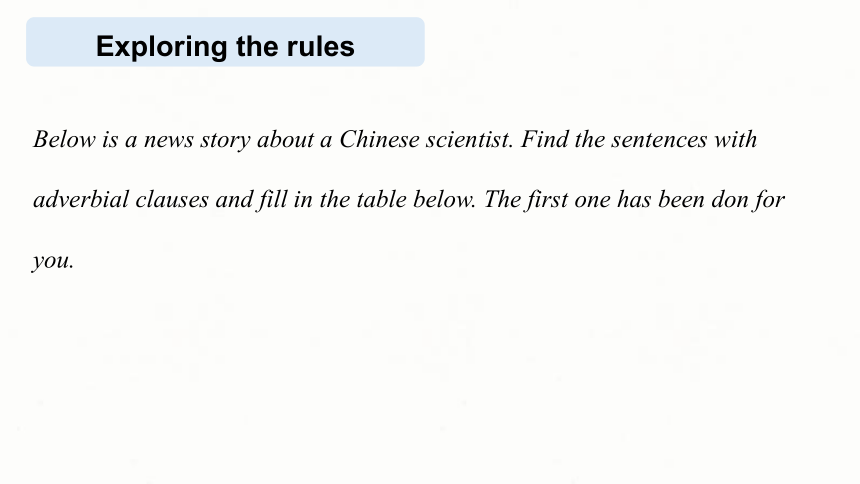
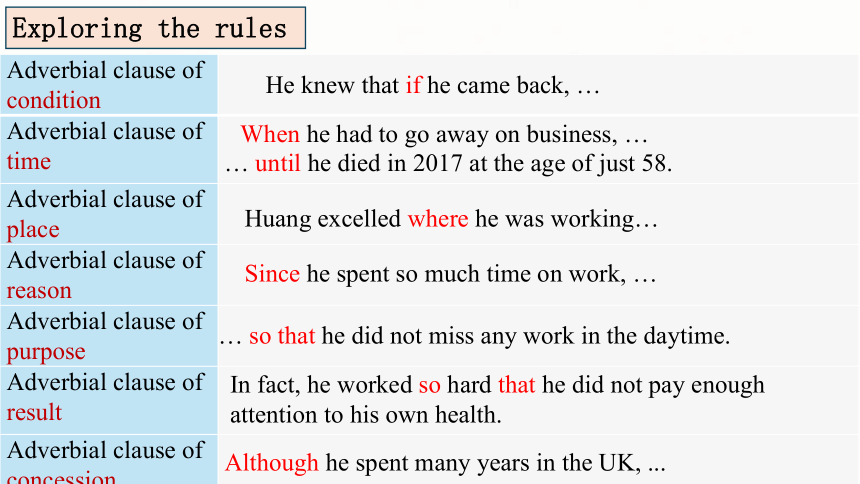
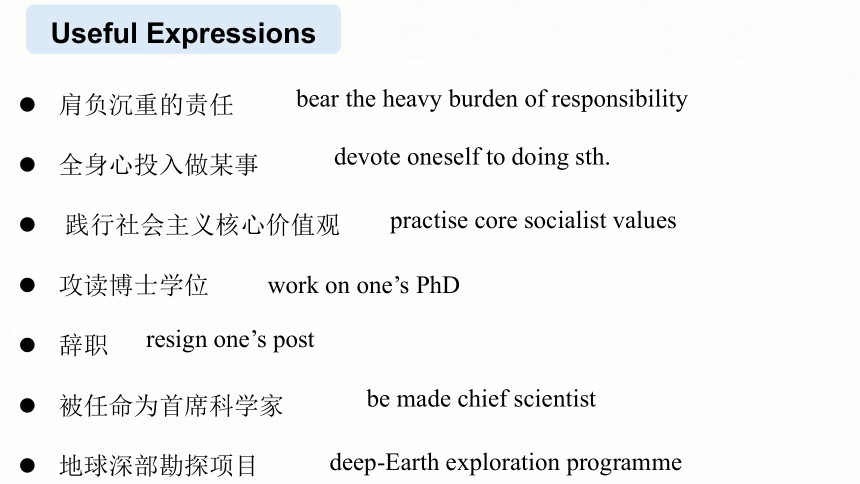
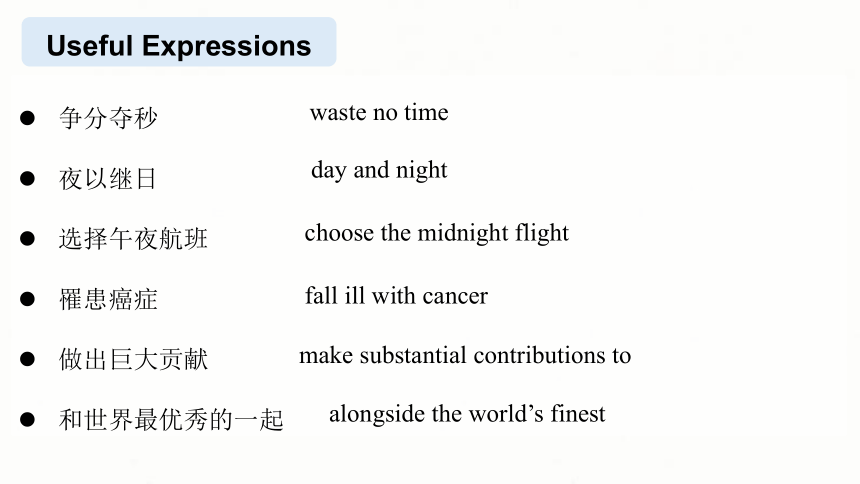
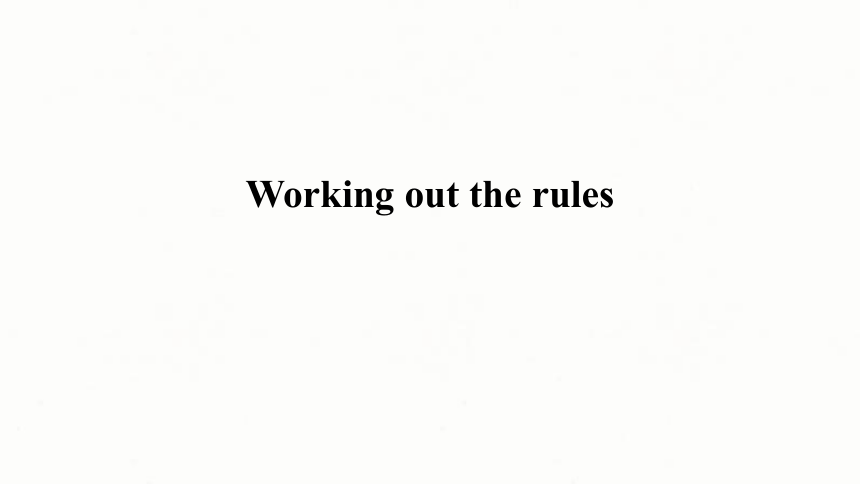
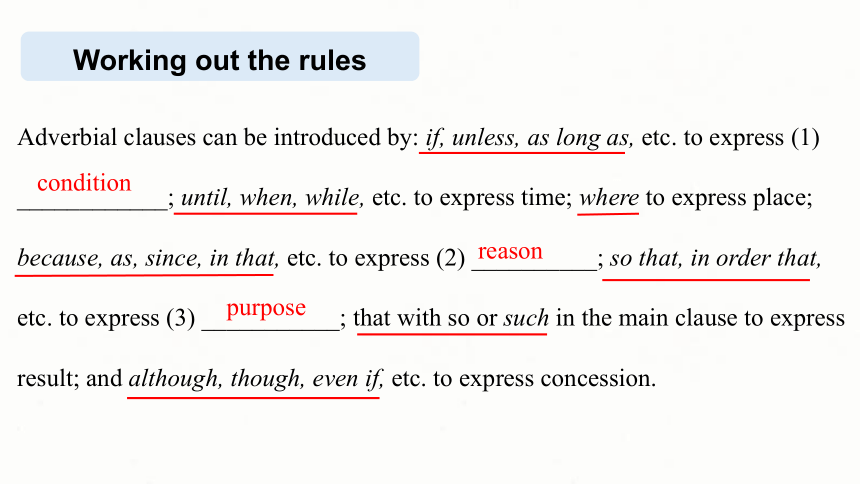
文档简介
(共46张PPT)
Unit1
Honesty and responsibility
Grammar and Usage
By the end of this class,you will be able to:
1.categorize adverbial clauses;
2.work out the rules of adverbial clauses;
3.make correct sentences and complete a passage using adverbial clauses;
4.use adverbial clauses to describe a person practising honesty and responsibility.
Exploring the rules
Core socialist values
prosperity democracy civility harmony
freedom equality justice the rule of law
patriotism dedication integrity friendship
honesty and responsibility
Lead-in
Huang Danian黄大年
Read the article on page 6 and answer the following questions.
1) Who was Huang Danian
He was a geophysicist who made great contributions to China.
2) What contributions did he make
He mapped the world under the Earth’s surface, which helped discover valuable mineral resources and brought China’s knowledge and technology in this area alongside the world’s finest.
Exploring the rules
Below is a news story about a Chinese scientist. Find the sentences with adverbial clauses and fill in the table below. The first one has been don for you.
Exploring the rules
Exploring the rules
Adverbial clause of condition
Adverbial clause of time
Adverbial clause of place
Adverbial clause of reason
Adverbial clause of purpose
Adverbial clause of result
Adverbial clause of concession Although he spent many years in the UK, ...
He knew that if he came back, …
When he had to go away on business, …
… until he died in 2017 at the age of just 58.
Huang excelled where he was working…
Since he spent so much time on work, …
… so that he did not miss any work in the daytime.
In fact, he worked so hard that he did not pay enough attention to his own health.
肩负沉重的责任
全身心投入做某事
践行社会主义核心价值观
攻读博士学位
辞职
被任命为首席科学家
地球深部勘探项目
bear the heavy burden of responsibility
devote oneself to doing sth.
practise core socialist values
work on one’s PhD
resign one’s post
be made chief scientist
deep-Earth exploration programme
Useful Expressions
争分夺秒
夜以继日
选择午夜航班
罹患癌症
做出巨大贡献
和世界最优秀的一起
waste no time
day and night
choose the midnight flight
fall ill with cancer
make substantial contributions to
alongside the world’s finest
Useful Expressions
Working out the rules
Working out the rules
Adverbial clauses can be introduced by: if, unless, as long as, etc. to express (1) ____________; until, when, while, etc. to express time; where to express place; because, as, since, in that, etc. to express (2) __________; so that, in order that, etc. to express (3) ___________; that with so or such in the main clause to express result; and although, though, even if, etc. to express concession.
condition
reason
purpose
时间状语从句
从句类型 常见连词 补充
时间状语从句 when, as, while, whenever, after, before, till / until, as soon as, since, once, by the time, no sooner ... than, hardly / scarcely ... when, ... every time, the moment, the minute, immediately
也可引导时间状语从句
(1) when, while,as 引导时间状语从句
when 从句谓语动词为延续性或非延续性动词,主从句动作可以同时发生,也可以先后发生。
while 从句谓语动词为延续性动词或表示状态的词,强调主从句动作同时发生。
as 从句谓语动词一般为延续性动词。主从句动作同时发生或交替进行,意为“一边……,一边……;随着”。
It was raining when we arrived.
While I was watching TV, the bell rang.
As she grew older, she gained in confidence.
(2) before 和 since 引导的时间状语从句
连词 常用句式
before It will be/ was+一段时间+before... 要过/过了好久…才…
It won't be/ wasn’t+一段时间+before... 过不了多久/没过多久就…了
since It is/ has been+一段时间+since从句 自从…以来已经多长时间了
(从句用一般过去时, 主句用现在完成时)
It will be four days before they come back. 他们要过四天才能回来。
We haven’t seen each other since we broke up. 我们自从分手以后一直没见过面。
It has been (is) six years since she graduated from the university.
until/ till 用于肯定句时,主谓动为延续性动词,“直到…为止”
not...until/ till...所在的主谓动为非延续性动词, “直到…才…”
till 不可以置于句首,而 until 可以置于句首。
not until 放在句首,主句要部分倒装
it is/was not until...that...强调句型(不倒装)
(3) until/ till 引导时间状语从句
His mother won’t go to bed until he returns home every evening.
Until he returns home every evening his mother will go to bed.
Not until he returns home every evening will his mother go to bed.
It is not until he returns home every evening that his mother will go to bed.
hardly/ scarcely...when..., no sooner...than...引导时间状语从句时,
主句用过去完成时,从句用一般过去时。
the moment, the minute, directly, instantly, the instant, as soon as...
(4) 表示“一…就…”的连词引导的时间状语从句
We had no sooner arrived at the station than the train left.
The little boy burst into tears immediately he saw his mother.
e.g. 那个小男孩一见到他妈妈便哭了起来。
e.g. 我们一到车站,火车就离站了。
如果从句的谓语动词用一般过去时,主句的谓语动词用过去完成时;
如果从句的谓语动词用一般现在时,主句的谓语动词用将来完成时。
By the time we got there, the rain had stopped.
到我们到达那儿时,雨已经停了。
By the time you come here tomorrow, I will have finished this work.
你明天来这儿的时候,我将已经完成此工作了。
(5) every time, (the) next time, any time, the first time,by the time(当…时候)等其他连词引导时间状语从句
地点状语从句
I'm unsatisfied with where I live. 我对自己住的地方特不满意。
You can sit wherever you like. 你喜欢坐哪都可以。
由where引导的地点状语从句与定语从句的区别:
where引导定语从句时,从句前应有先行词,而状语从句前没有先行词。
① Bamboo grows best in places where it is warm and it rains often.
② Bamboo grows best where it is warm and it rains often.
原因状语从句
从句类型 常见连词 补充
原因状语从句 because, since, as, for, now (that)(由于) ... seeing (that) (鉴于), in that, considering/given (that)... 也可引导原因状语从句
She got the job, because she was the best candidate.
Since/ As we have no money, we can’t buy it.
Seeing (that) the weather is bad,we’ll stay at home.
He seldom goes out now, for he is very old.
目的状语从句
He got up early so that/ in order that he could catch the early train.
You’d better take the keys in case I’m out.
I will not make a noise for fear that I disturb you.
I shall write it down lest I should forget.
从句类型 常见连词 补充
目的状语从句 so that, in order that ... 谓语动词前常带有情态动词;
in case, lest, for fear (that)(唯恐) 也可引导目的状语从句
结果状语从句
从句类型 常见连词
结果状语从句 so, so that, so ... that, such ... that ...
He is so handsome that we all like him.
He is such a handsome person that we all like him.
区分:
目的状语从句中常有can, could, may, might, will, would, should等情态动词。
结果状语从句表示客观事实,谓语动词用陈述语气,从句中通常无情态动词。
条件状语从句
从句类型 常见连词 补充
条件状语从句 if, unless, so / as long as, only if, once, on condition that ... if 不能用 whether 替换;providing/provided that; suppose/ supposing (that)(假如)...也可引导条件状语从句
You can use my bike as long as you return it on time.
If you fail in the exam, you will let him down.
Unless you change your mind, I won't help you.
You can go out providing that you have to finish your homework.
让步状语从句
从句类型 常见连词 补充
让步状语从句 although, though, even if / though, as, while ... 由“特殊疑问词+ever”,“no matter +疑问词”以及whether...or 也可引导让步状语从句
(1) although/ though引导让步状语从句,不与but连用,但可与yet/ still连用。
He is unhappy, though/although he has a lot of money.
Clever though you may be, you cannot do that.
(2)no matter后接who,what,where,how等疑问词引导让步状语从句,也可以在这类疑问词后面加上ever构成whoever,whatever,wherever,however等。但在引导名词性从句时只能用“疑问词+ever”类词。
Don’t trust him, no matter what/whatever he says.
I will eat whatever you give me.
(3) while 引导让步状语从句,意为“尽管”,常位于句首。
While we don’t agree on the matter, we continue to be friends.
(4) as引导让步状语从句,需将从句中的表语、状语以及谓语中的实义动词提前至从句句首,引起倒装;作表语的单数可数名词前如有冠词,冠词需省去。
Child as/ though he is,he knows a lot.
Successful as he is, he is not proud.
Much as I like it,I won’t buy.
Try as he would/might,he couldn’t lift the heavy box.
He looks as if he is angry. 他看上去好像生气了。
方式状语从句
从句类型 常见连词
方式状语从句 as, as if/ though ...
as if/ as though引导的的从句可用陈述语气,表示(可能) 符合事实的情况;也可以用虚拟语气,表示与事实相反的假设。
She is not so/as outgoing as her sister.
她不如她姐姐外向。
She is as tall as Tom.
她与汤姆一样高。
比较状语从句
从句类型 常见连词 补充
比较状语从句 than,as…as… ,the same as,not as/so…as… 比较级+than,the+比较级...,the+比较级... providing/ provided that; suppose/ supposing (that)(假如)...也可引导条件状语从句
在表示时间、条件、让步等的状语从句中,如果从句的主语和主句的主语相同或从句的主语是it,从句的谓语又含有be的某种形式时,可以省略从句中的主语和be动词,从而构成
“从属连词+形容词/现在分词/过去分词/名词/介词短语/不定式”结构。
If (it is) possible, please look up the word in the dictionary.
如果可能的话,请在词典里查阅那个单词。
He is a good man, though sometimes (he is) rather dull.
他是个好人,尽管有时很愚钝。
While (I was) passing by the supermarket, I met my friend.
路过超市时,我遇见了我的朋友。
Unless (I am) invited, I won't take part in the activity.
除非有人邀请,否则我不会参加那个活动。
状语从句的省略
状语从句和非谓语动词之间的替换
2. Because he was poor, he couldn’t afford a TV set.
1. When I walked in the street, I saw a tailor’s shop.
= Walking in the street, I saw a tailor's shop.
= Being poor, he couldn't afford a TV set.
= Left alone at home, the little boy didn’t feel afraid at all.
3. Although he was left alone at home, the little boy didn’t feel afraid at all.
4. If we were given more time, we would be able to do the work much better.
= Given more time, we would be able to do the work
much better.
当主从句的主谓一致,且从句的谓语为主动语态,可用V-ing短语转换。
当主从句的主谓一致,且从句的谓语为被动语态,可用V-ed短语转换。
V-ed/V-ing形式在句中可充当时间、原因、条件、让步状语,相当于一个状语从句。
Applying the rules
Applying the rules
1. Jake got up early so that he would have time to exercise before class.
2. Although she had not edited the photos, they still looked very good.
3. He went to work as if nothing had happened.
4. Her teacher liked her because she was so hard-working.
5. I get very upset when people do not tell me the truth.
6. If you are nice to other people, they will be nice to you.
Applying the rules
B 2
The news story below is about a social media plete it with the correct adverbial clauses in the box below. There are two clauses you do NOT need to use. Write the letters in the blanks.
Applying the rules
Lily used to be a fitness coach and a social media influencer. The number of her followers reached a million just last month. Every day, she would post photos of herself working out, or just posing in workout clothes. She looked superb in these photos.
(1) ______, they were not one hundred per cent real. Actually, they were taken by a professional photographer. Besides, they were also carefully edited (2) _______. We know that social media influencers sometimes post their photos for fun, but companies pay them to do so (3) _______. Lily was no exception. The clothes she was wearing in those photos were sponsored by companies. She was paid to wear them.
c
e
b
Lily was not happy about the photos, though. “I was feeling guilty (4) ______,” she said. “I was so ashamed of myself. I couldn’t bear living a lie any more. I hope my fans can forgive me.” (5) ______, she closed her online account.
f
a
B3 Describe a person practicing honesty and responsibility using adverbial clauses.
Useful sentence patterns:
XXX is a good example of someone who practises honesty and responsibility.
His classmates elect him as class monitor because______.
His colleagues show respect for him because________.
Although he____________, he manages to____________.
He will not ________ unless _________.
If his friends _____________, they often ________ because they know he will_________.
He once said, “I’m just doing what I can so that________.”
……
Describe a person practising honesty and responsibility using adverbial clauses.
B 3
Applying the rules
My friend Peter is a good example of someone who practises honesty and responsibility. Since he was quite young, Peter has been regarded as a “good" boy. His classmates have elected him as class monitor because they know Peter is reliable. He has devoted a lot of time to helping his classmates and the class teacher, earning him high praise. Although he is very busy, he manages to do other activities such as guitar lessons. His parents were concerned that guitar lessons would take up too much of his time, but Peter assured them he made such a strict schedule that he could handle it.
It turns out that Peter has kept a good balance between his study and his hobby. Peter has many friends, who like him and trust him more than others. If his friends have a disagreement, they often approach him because they know he will speak the truth and give his honest opinion. He once said, “I'm just doing what I can and try to make smart choices in order that I can help my friends, teachers and family. Where I am needed, I will be there.”
1. _____ I had to make just one recommendation for where to stay in Rome, it would be Yellow Hostel.
2. The French take their 35-hour workweek seriously - ____ seriously ______some labor unions recently struck a deal with a group of companies limiting the number of hours that independent contractors can be on call.
If
so
that
Practice
3. The main concern here is the amount of energy that goes into the making of new products and whether or not that extra carbon is worth the footprint the product will make ______ it gets to you.
4. Plastic straws are by no means the biggest source (来源) of plastic pollution, but they’ve recently come under fire _________ most people don’t need them to drink with and, because of their small size and weight, they cannot be recycled.
once
because
5. It is different from traditional tourism _______ it allows the traveler to become educated about the areas-both in terms of geographical conditions and cultural characteristics, and often provides money for conservation and benefits the development of the local areas.
6. _______ contributions were made by geniuses outside the club - women, or people of a different color or belief - they were unacknowledged and rejected by others.
because
When
7. He remembered landmarks, but _____ he didn’t know his town’s name, finding a small neighborhood in a vast country proved to be impossible.
8. –Why does Jack Ma still work so hard _____ he has already owned so much money
– Maybe he pursues more than money.
A. while B. as C. when D. before
9. Unfortunately, __________ we should expect gratitude, we often find the opposite.
A. what B. that C. how D. where
since
10. Under the regulation, restaurants and hotels shall stop offering throwaway items _______ customers request them.
A. since B. once C. unless D. until
11. On our way to the house, it was raining ____ hard _____ we couldn't help wondering how long it would take to get there.
12. Tom is so independent that he never asks his parents' opinion________ he wants their support.
A. since B. once C. unless D. after
so
that
Unit1
Honesty and responsibility
Grammar and Usage
By the end of this class,you will be able to:
1.categorize adverbial clauses;
2.work out the rules of adverbial clauses;
3.make correct sentences and complete a passage using adverbial clauses;
4.use adverbial clauses to describe a person practising honesty and responsibility.
Exploring the rules
Core socialist values
prosperity democracy civility harmony
freedom equality justice the rule of law
patriotism dedication integrity friendship
honesty and responsibility
Lead-in
Huang Danian黄大年
Read the article on page 6 and answer the following questions.
1) Who was Huang Danian
He was a geophysicist who made great contributions to China.
2) What contributions did he make
He mapped the world under the Earth’s surface, which helped discover valuable mineral resources and brought China’s knowledge and technology in this area alongside the world’s finest.
Exploring the rules
Below is a news story about a Chinese scientist. Find the sentences with adverbial clauses and fill in the table below. The first one has been don for you.
Exploring the rules
Exploring the rules
Adverbial clause of condition
Adverbial clause of time
Adverbial clause of place
Adverbial clause of reason
Adverbial clause of purpose
Adverbial clause of result
Adverbial clause of concession Although he spent many years in the UK, ...
He knew that if he came back, …
When he had to go away on business, …
… until he died in 2017 at the age of just 58.
Huang excelled where he was working…
Since he spent so much time on work, …
… so that he did not miss any work in the daytime.
In fact, he worked so hard that he did not pay enough attention to his own health.
肩负沉重的责任
全身心投入做某事
践行社会主义核心价值观
攻读博士学位
辞职
被任命为首席科学家
地球深部勘探项目
bear the heavy burden of responsibility
devote oneself to doing sth.
practise core socialist values
work on one’s PhD
resign one’s post
be made chief scientist
deep-Earth exploration programme
Useful Expressions
争分夺秒
夜以继日
选择午夜航班
罹患癌症
做出巨大贡献
和世界最优秀的一起
waste no time
day and night
choose the midnight flight
fall ill with cancer
make substantial contributions to
alongside the world’s finest
Useful Expressions
Working out the rules
Working out the rules
Adverbial clauses can be introduced by: if, unless, as long as, etc. to express (1) ____________; until, when, while, etc. to express time; where to express place; because, as, since, in that, etc. to express (2) __________; so that, in order that, etc. to express (3) ___________; that with so or such in the main clause to express result; and although, though, even if, etc. to express concession.
condition
reason
purpose
时间状语从句
从句类型 常见连词 补充
时间状语从句 when, as, while, whenever, after, before, till / until, as soon as, since, once, by the time, no sooner ... than, hardly / scarcely ... when, ... every time, the moment, the minute, immediately
也可引导时间状语从句
(1) when, while,as 引导时间状语从句
when 从句谓语动词为延续性或非延续性动词,主从句动作可以同时发生,也可以先后发生。
while 从句谓语动词为延续性动词或表示状态的词,强调主从句动作同时发生。
as 从句谓语动词一般为延续性动词。主从句动作同时发生或交替进行,意为“一边……,一边……;随着”。
It was raining when we arrived.
While I was watching TV, the bell rang.
As she grew older, she gained in confidence.
(2) before 和 since 引导的时间状语从句
连词 常用句式
before It will be/ was+一段时间+before... 要过/过了好久…才…
It won't be/ wasn’t+一段时间+before... 过不了多久/没过多久就…了
since It is/ has been+一段时间+since从句 自从…以来已经多长时间了
(从句用一般过去时, 主句用现在完成时)
It will be four days before they come back. 他们要过四天才能回来。
We haven’t seen each other since we broke up. 我们自从分手以后一直没见过面。
It has been (is) six years since she graduated from the university.
until/ till 用于肯定句时,主谓动为延续性动词,“直到…为止”
not...until/ till...所在的主谓动为非延续性动词, “直到…才…”
till 不可以置于句首,而 until 可以置于句首。
not until 放在句首,主句要部分倒装
it is/was not until...that...强调句型(不倒装)
(3) until/ till 引导时间状语从句
His mother won’t go to bed until he returns home every evening.
Until he returns home every evening his mother will go to bed.
Not until he returns home every evening will his mother go to bed.
It is not until he returns home every evening that his mother will go to bed.
hardly/ scarcely...when..., no sooner...than...引导时间状语从句时,
主句用过去完成时,从句用一般过去时。
the moment, the minute, directly, instantly, the instant, as soon as...
(4) 表示“一…就…”的连词引导的时间状语从句
We had no sooner arrived at the station than the train left.
The little boy burst into tears immediately he saw his mother.
e.g. 那个小男孩一见到他妈妈便哭了起来。
e.g. 我们一到车站,火车就离站了。
如果从句的谓语动词用一般过去时,主句的谓语动词用过去完成时;
如果从句的谓语动词用一般现在时,主句的谓语动词用将来完成时。
By the time we got there, the rain had stopped.
到我们到达那儿时,雨已经停了。
By the time you come here tomorrow, I will have finished this work.
你明天来这儿的时候,我将已经完成此工作了。
(5) every time, (the) next time, any time, the first time,by the time(当…时候)等其他连词引导时间状语从句
地点状语从句
I'm unsatisfied with where I live. 我对自己住的地方特不满意。
You can sit wherever you like. 你喜欢坐哪都可以。
由where引导的地点状语从句与定语从句的区别:
where引导定语从句时,从句前应有先行词,而状语从句前没有先行词。
① Bamboo grows best in places where it is warm and it rains often.
② Bamboo grows best where it is warm and it rains often.
原因状语从句
从句类型 常见连词 补充
原因状语从句 because, since, as, for, now (that)(由于) ... seeing (that) (鉴于), in that, considering/given (that)... 也可引导原因状语从句
She got the job, because she was the best candidate.
Since/ As we have no money, we can’t buy it.
Seeing (that) the weather is bad,we’ll stay at home.
He seldom goes out now, for he is very old.
目的状语从句
He got up early so that/ in order that he could catch the early train.
You’d better take the keys in case I’m out.
I will not make a noise for fear that I disturb you.
I shall write it down lest I should forget.
从句类型 常见连词 补充
目的状语从句 so that, in order that ... 谓语动词前常带有情态动词;
in case, lest, for fear (that)(唯恐) 也可引导目的状语从句
结果状语从句
从句类型 常见连词
结果状语从句 so, so that, so ... that, such ... that ...
He is so handsome that we all like him.
He is such a handsome person that we all like him.
区分:
目的状语从句中常有can, could, may, might, will, would, should等情态动词。
结果状语从句表示客观事实,谓语动词用陈述语气,从句中通常无情态动词。
条件状语从句
从句类型 常见连词 补充
条件状语从句 if, unless, so / as long as, only if, once, on condition that ... if 不能用 whether 替换;providing/provided that; suppose/ supposing (that)(假如)...也可引导条件状语从句
You can use my bike as long as you return it on time.
If you fail in the exam, you will let him down.
Unless you change your mind, I won't help you.
You can go out providing that you have to finish your homework.
让步状语从句
从句类型 常见连词 补充
让步状语从句 although, though, even if / though, as, while ... 由“特殊疑问词+ever”,“no matter +疑问词”以及whether...or 也可引导让步状语从句
(1) although/ though引导让步状语从句,不与but连用,但可与yet/ still连用。
He is unhappy, though/although he has a lot of money.
Clever though you may be, you cannot do that.
(2)no matter后接who,what,where,how等疑问词引导让步状语从句,也可以在这类疑问词后面加上ever构成whoever,whatever,wherever,however等。但在引导名词性从句时只能用“疑问词+ever”类词。
Don’t trust him, no matter what/whatever he says.
I will eat whatever you give me.
(3) while 引导让步状语从句,意为“尽管”,常位于句首。
While we don’t agree on the matter, we continue to be friends.
(4) as引导让步状语从句,需将从句中的表语、状语以及谓语中的实义动词提前至从句句首,引起倒装;作表语的单数可数名词前如有冠词,冠词需省去。
Child as/ though he is,he knows a lot.
Successful as he is, he is not proud.
Much as I like it,I won’t buy.
Try as he would/might,he couldn’t lift the heavy box.
He looks as if he is angry. 他看上去好像生气了。
方式状语从句
从句类型 常见连词
方式状语从句 as, as if/ though ...
as if/ as though引导的的从句可用陈述语气,表示(可能) 符合事实的情况;也可以用虚拟语气,表示与事实相反的假设。
She is not so/as outgoing as her sister.
她不如她姐姐外向。
She is as tall as Tom.
她与汤姆一样高。
比较状语从句
从句类型 常见连词 补充
比较状语从句 than,as…as… ,the same as,not as/so…as… 比较级+than,the+比较级...,the+比较级... providing/ provided that; suppose/ supposing (that)(假如)...也可引导条件状语从句
在表示时间、条件、让步等的状语从句中,如果从句的主语和主句的主语相同或从句的主语是it,从句的谓语又含有be的某种形式时,可以省略从句中的主语和be动词,从而构成
“从属连词+形容词/现在分词/过去分词/名词/介词短语/不定式”结构。
If (it is) possible, please look up the word in the dictionary.
如果可能的话,请在词典里查阅那个单词。
He is a good man, though sometimes (he is) rather dull.
他是个好人,尽管有时很愚钝。
While (I was) passing by the supermarket, I met my friend.
路过超市时,我遇见了我的朋友。
Unless (I am) invited, I won't take part in the activity.
除非有人邀请,否则我不会参加那个活动。
状语从句的省略
状语从句和非谓语动词之间的替换
2. Because he was poor, he couldn’t afford a TV set.
1. When I walked in the street, I saw a tailor’s shop.
= Walking in the street, I saw a tailor's shop.
= Being poor, he couldn't afford a TV set.
= Left alone at home, the little boy didn’t feel afraid at all.
3. Although he was left alone at home, the little boy didn’t feel afraid at all.
4. If we were given more time, we would be able to do the work much better.
= Given more time, we would be able to do the work
much better.
当主从句的主谓一致,且从句的谓语为主动语态,可用V-ing短语转换。
当主从句的主谓一致,且从句的谓语为被动语态,可用V-ed短语转换。
V-ed/V-ing形式在句中可充当时间、原因、条件、让步状语,相当于一个状语从句。
Applying the rules
Applying the rules
1. Jake got up early so that he would have time to exercise before class.
2. Although she had not edited the photos, they still looked very good.
3. He went to work as if nothing had happened.
4. Her teacher liked her because she was so hard-working.
5. I get very upset when people do not tell me the truth.
6. If you are nice to other people, they will be nice to you.
Applying the rules
B 2
The news story below is about a social media plete it with the correct adverbial clauses in the box below. There are two clauses you do NOT need to use. Write the letters in the blanks.
Applying the rules
Lily used to be a fitness coach and a social media influencer. The number of her followers reached a million just last month. Every day, she would post photos of herself working out, or just posing in workout clothes. She looked superb in these photos.
(1) ______, they were not one hundred per cent real. Actually, they were taken by a professional photographer. Besides, they were also carefully edited (2) _______. We know that social media influencers sometimes post their photos for fun, but companies pay them to do so (3) _______. Lily was no exception. The clothes she was wearing in those photos were sponsored by companies. She was paid to wear them.
c
e
b
Lily was not happy about the photos, though. “I was feeling guilty (4) ______,” she said. “I was so ashamed of myself. I couldn’t bear living a lie any more. I hope my fans can forgive me.” (5) ______, she closed her online account.
f
a
B3 Describe a person practicing honesty and responsibility using adverbial clauses.
Useful sentence patterns:
XXX is a good example of someone who practises honesty and responsibility.
His classmates elect him as class monitor because______.
His colleagues show respect for him because________.
Although he____________, he manages to____________.
He will not ________ unless _________.
If his friends _____________, they often ________ because they know he will_________.
He once said, “I’m just doing what I can so that________.”
……
Describe a person practising honesty and responsibility using adverbial clauses.
B 3
Applying the rules
My friend Peter is a good example of someone who practises honesty and responsibility. Since he was quite young, Peter has been regarded as a “good" boy. His classmates have elected him as class monitor because they know Peter is reliable. He has devoted a lot of time to helping his classmates and the class teacher, earning him high praise. Although he is very busy, he manages to do other activities such as guitar lessons. His parents were concerned that guitar lessons would take up too much of his time, but Peter assured them he made such a strict schedule that he could handle it.
It turns out that Peter has kept a good balance between his study and his hobby. Peter has many friends, who like him and trust him more than others. If his friends have a disagreement, they often approach him because they know he will speak the truth and give his honest opinion. He once said, “I'm just doing what I can and try to make smart choices in order that I can help my friends, teachers and family. Where I am needed, I will be there.”
1. _____ I had to make just one recommendation for where to stay in Rome, it would be Yellow Hostel.
2. The French take their 35-hour workweek seriously - ____ seriously ______some labor unions recently struck a deal with a group of companies limiting the number of hours that independent contractors can be on call.
If
so
that
Practice
3. The main concern here is the amount of energy that goes into the making of new products and whether or not that extra carbon is worth the footprint the product will make ______ it gets to you.
4. Plastic straws are by no means the biggest source (来源) of plastic pollution, but they’ve recently come under fire _________ most people don’t need them to drink with and, because of their small size and weight, they cannot be recycled.
once
because
5. It is different from traditional tourism _______ it allows the traveler to become educated about the areas-both in terms of geographical conditions and cultural characteristics, and often provides money for conservation and benefits the development of the local areas.
6. _______ contributions were made by geniuses outside the club - women, or people of a different color or belief - they were unacknowledged and rejected by others.
because
When
7. He remembered landmarks, but _____ he didn’t know his town’s name, finding a small neighborhood in a vast country proved to be impossible.
8. –Why does Jack Ma still work so hard _____ he has already owned so much money
– Maybe he pursues more than money.
A. while B. as C. when D. before
9. Unfortunately, __________ we should expect gratitude, we often find the opposite.
A. what B. that C. how D. where
since
10. Under the regulation, restaurants and hotels shall stop offering throwaway items _______ customers request them.
A. since B. once C. unless D. until
11. On our way to the house, it was raining ____ hard _____ we couldn't help wondering how long it would take to get there.
12. Tom is so independent that he never asks his parents' opinion________ he wants their support.
A. since B. once C. unless D. after
so
that
同课章节目录
